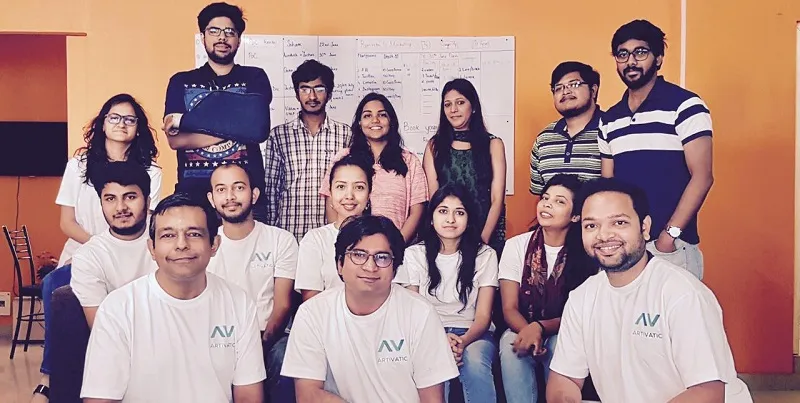Artivatic is building end-to-end smart AI infrastructure for banks, financial firms
Bengaluru-based Artivatic uses patterns of psychology, genomics science and neuroscience capabilities to automate decision making in real time to improve ROI, cross-sector intelligence and personalised recommendation experience.
In Koramangala, a youthful suburb in Bengaluru, an eight-member team is working with a couple of banks and insurance companies to verify KYC and product underwriting without human interface.
Artivatic is building a machine that can provide an insurance policy or a loan to individuals in a matter of minutes. It is able to study a prospective customer's bank history and verify their Aadhaar details before underwriting a policy or disbursing a loan.
It all began 10 months ago when Layak Singh and Puneet Tandon decided to use their experience in machine learning to build an AI engine that could make banks win customers faster and reduce non-performing assets by studying the credit history of a prospective client.

Artivatic now builds, licences and sells its proprietary “human brain-like AI systems”, which are based on genomics and neuroscience capabilities, to scale efficiency. The engine uses “cross-connected-intelligence-genome”, “decision intelligence” and more to empower the businesses in industries such as finance and healthcare.
The startup allows all processes, business tasks, data analytics, marketing, strategy, insights, delivery, interaction, tracking and personalisation in real time through a single AI interface.
“We are currently with two banking and financial services clients, solving their customer verification process with AI,” Layak says. He adds that if their 10 off POCs go commercial by the end of this year, Artivatic will become the first startup to introduce neuro-linguistic programming (NLP) in the banking sector in India to verify customers and their credit scores.
AI and Machine Learning are words that are used interchangeably. But Artificial Intelligence uses machine learning to make devices smart while Machine Learning is the step where massive amounts of data are infused into the system to learn.
“We are using the best minds in data engineering to teach the machine,” Layak says.
The company has received $1,75,000 in funding from Layak and angel investors.
The beginning and the business
Layak is an IIT Kharagpur graduate and Puneet is an engineering student from the New Jersey Institute of Technology. Both of them had earlier experience with startups and corporates and met in Bengaluru.
Layak had worked on three startups, which he says taught him to build the product first and then the service.
“Our team can scale up to multiple products and verticals. While building AI engines one must forge customer interaction with corporate processes,” he says. He adds that his education startup in Liverpool brought him enough money to pursue building an AI startup.
According to IDC, widespread adoption of cognitive systems and artificial intelligence (AI) across a broad range of industries will drive worldwide revenues from nearly $8.0 billion in 2016 to more than $47 billion in 2020. A new Worldwide Semiannual Cognitive/Artificial Intelligence Systems Spending Guide from International Data Corporation (IDC) revealed that the market for cognitive/AI solutions will experience a compound annual growth rate (CAGR) of 55.1 percent over the 2016-2020 forecast period.
David Schubmehl, research director, Cognitive Systems and Content Analytics at IDC, says: "Software developers and end-user organisations have already begun the process of embedding and deploying cognitive/artificial intelligence into almost every kind of enterprise application or process.”
The ability to recognise and respond to data flows using algorithms and rule-based logic enables cognitive/AI systems to automate a broad range of functions across many industries. The use cases that attracted the most investment in 2016 are automated customer service agents, quality management investigation and recommendation systems, diagnosis and treatment systems, and fraud analysis and investigation.
The report adds that the use cases that will experience the fastest revenue growth over the next five years are public safety and emergency response, pharmaceutical research and discovery, diagnosis and treatment systems, supply and logistics, quality management investigation and recommendation systems, and fleet management.
So Layak is on the money in chasing the banking industry. Companies like Racetrack.ai are chasing real estate and other allied service industries to use AI-powered services. Niki.ai is gaining traction because of the $2million funding it received recently from SAP.
Globally there are businesses like Prisma, ReSnap and ViSense that use AI. All these companies use computer vision and NLP to make suggestions to users.
The business model for most AI companies is based on a per-query payment along with annual maintenance fees.
Naganand Doraswamy, founder of IdeaSpring Capital, says: “Indian engineers can build great AI startups and large corporates are already making inroads into AI use.”
Layak believes he needs to scale up quickly with commercial projects as the talent for AI was expensive and difficult to find.
“I am spending all my money in getting the right talent,” he says.
With Axis Bank acquiring Free Charge, Indian corporates are now opening up to work with startups. Only time will tell if Indian corporates will start sign commercial deals with AI startups. Artivatic seem to have a bright chance of getting there.







